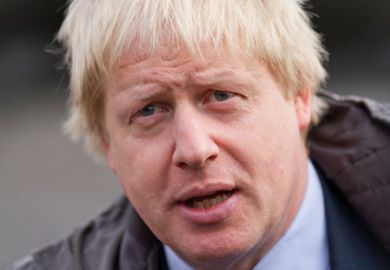A package of UK government research announcements on the eve of Brexit has been seen as confirming that science is a bigger part of its policy platform “than any government for decades”, with visa liberalisation welcomed as “getting the Home Office’s hands off the levers of power”, and the removal of impact assessments from grant applications seen as a sign of the growing influence of Dominic Cummings, the prime minister’s most senior adviser.
This week the government announced a new fast-track visa scheme “to attract the world’s top scientists, researchers and mathematicians”, an investment “of up to £300 million to fund experimental and imaginative mathematical sciences research” and “a major review of research bureaucracy and methods”.
No 10 is thought to have instigated work on the visa plan in July, immediately after Boris Johnson became prime minister and Mr Cummings entered office. Under the changes, a “Global Talent” scheme – to be managed by UK Research and Innovation, not the Home Office – will replace the Exceptional Talent route, which was capped at 2,000 places a year.
It will come into effect on 20 February, just weeks after the UK leaves the European Union on 31 January. Although the Exceptional Talent scheme never hit its cap, demand is likely to be much higher after Brexit because EU researchers are expected to need visas to work in the country after freedom of movement ends.
However, the question of whether the UK will remain part of the EU’s research programmes – with access to European Research Council grants likely to be a major factor in the ability of British universities to attract the world’s best researchers – is yet to be settled.
Stian Westlake, a former adviser to three Conservative science ministers, said of the announcements: “This is a sign the government really does take science and innovation seriously, that it’s a really big part of its political platform, arguably more so than any government for decades.”
Science policy experts regard Mr Cummings as having a vision to make science the driving force of the post-Brexit UK economy, with his particular emphasis said to be on making the UK the “Silicon Valley of Europe” through enhanced support for science that can lead to breakthrough technology and innovation.
Nick Hillman, director of the Higher Education Policy Institute, welcomed the visa announcement as getting “the Home Office’s hands off the levers of power”.
Mr Hillman, a veteran of battles with that department as a former adviser to Lord Willetts in his time as universities minister, said: “There are too many people in the Home Office who think their job is to keep people out of the UK, even when their presence here would clearly bring huge benefits.”
However, Kurt Deketelaere, secretary general of the League of European Research Universities, said that if the UK visa package “does not go hand in hand with associate membership to Horizon Europe”, the move would be of interest to only a “handful” of top scientists, “getting very well paid and being well supported, but completely missing the necessary and advantageous links with a high-performing research continent, the EU”.
Mr Cummings’ concern about research “bureaucracy” was known to have been aired at a No 10 roundtable he hosted with leading mathematicians last year. Dorothy Bishop, professor of developmental neuropsychology at the University of Oxford, was one of those present and said that the removal of sections of grant applications requiring researchers to predict the impact of their work had emerged as a priority.
“For mathematicians, predicting impact can be a crazy thing to do, particularly when you’re working on highly theoretical ideas,” said Professor Bishop, who said that this policy was “definitely coming from Dominic Cummings”.
While she agreed with the change, Professor Bishop said that she had concerns over where this type of intervention might lead. “In the short term, it might be popular but it could prove a dangerous precedent over the longer term,” she explained, saying that she feared that the budgets for some disciplines not favoured by Mr Cummings could be reduced in a “non-transparent way.”
“He has good ideas in some areas, but my concern is that he is dictating the agenda,” Professor Bishop said.
Graeme Reid, professor of science and research policy at UCL, said that he expected to see similar moves to cut bureaucracy as the UK attempted to increase research spending to 2.4 per cent of gross domestic product. He welcomed the end of the Pathways to Impact policy, saying that it relied on “unsubstantiated speculation” about research outcomes, which was “troublesome and bureaucratic.”
Professor Reid advocated bolder structural changes. “If you extended the length of every grant – from, say, three to four years – you would knock a big lump of bureaucracy out of the system,” he said.
POSTSCRIPT:
Print headline: Science at heart of UK’s post-Brexit policy agenda
Register to continue
Why register?
- Registration is free and only takes a moment
- Once registered, you can read 3 articles a month
- Sign up for our newsletter
Subscribe
Or subscribe for unlimited access to:
- Unlimited access to news, views, insights & reviews
- Digital editions
- Digital access to THE’s university and college rankings analysis
Already registered or a current subscriber?








